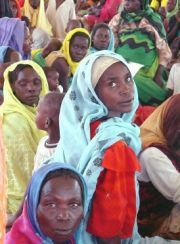As Darfur peace talks stall, refugees live life of fear
Nov 10, 2005 (KALMA REFUGEE CAMP, Darfur) — Far removed from government and rebel leaders jockeying for position in turgid peace talks, Khadija and two million other refugees in Darfur live in daily fear of killings, hunger and the end of hope.
 “I had to flee here – pregnant – 11 months ago to escape the fighters who attacked my village,” said Khadija, cradling her four-month-old daughter Sulafa in her arms at the Kalma refugee camp in southern Darfur. She would not give their second name for fear of reprisals for speaking out.
“I had to flee here – pregnant – 11 months ago to escape the fighters who attacked my village,” said Khadija, cradling her four-month-old daughter Sulafa in her arms at the Kalma refugee camp in southern Darfur. She would not give their second name for fear of reprisals for speaking out.
Kalma, which hosts at least 90,000 refugees, is the biggest camp in the remote western region and has been a hotbed of unrest.
Despite a cease-fire agreement last year, violence has spiralled in recent months in Darfur, where mostly non-Arab rebels launched a revolt against Sudan’s Islamist government in early 2003, accusing Khartoum of monopolising wealth and power.
The violence has left tens of thousands dead in what the United States has called genocide, a charge Khartoum denies.
Six rounds of peace talks between the central government and Darfur rebels have so far yielded few results, and splits within the main rebel group, the Sudan Liberation Army (SLA), have widened as its leaders squabble over who can represent Darfuris at the next round in Abuja on November 21.
“The camps are becoming less stable,” said Bob Kitchen, who heads the local programme of U.S.-based aid group International Rescue Committee. “The safety … is still compromised on a regular basis by incursions and violence outside the camps.”
U.S. PRESSURE
U.S. Deputy Secretary of State Robert Zoellick, who has been holding talks with the rebels and the government this week to push them to work harder towards a peace deal, went to Kalma on Thursday to see the suffering first hand on his fourth trip to Darfur to show U.S. support.
Beneath his approaching helicopter, a sea of blue, white and green tarpaulin sheets spread over thousands upon thousands of tents and makeshift huts sprawled out towards the horizon.
As his delegation entered Kalma, refugees huddled in a semi-circle often ten-people deep to catch glimpse of the visitors, while African Union soldiers – normally peacekeepers in Darfur – stood guard to keep the crowds in check.
Behind the teeming welcome party, the misery of the camp unfolded.
“I’ve been here for two years. My son was born here. But we do not feel safe. My wife Mariam was attacked,” said 42-year-old Adam Ali Taglu, pointing to his wife, who sat on the sand floor of their rickety hut with her arm in a makeshift splint and a bruise on her forehead.
“We have no work, no hope,” said Mona Ahmed, who lives with her eight children in a tiny hut, surrounded by a fence of twigs a slight wind could knock down.
Several refugees said armed horsemen had attacked the camp that morning, but U.S. officials were not able to confirm the incident.
The AU mission tries to keep peace, but officials say they are understaffed and underequipped.
Zoellick has been pushing the Khartoum government to show greater support for the troops, for example by allowing in 105 long-awaited armoured personnel carriers from Canada.
“We are like sitting ducks,” said Capt. Mutale Kasoma from Zambia, who is part of the peacekeeping mission. “If they (fighters) see an APC, they will get scared and run away.”
The town of Sharia and nearby Sheikh an-Nil village are a grim example of the 7,000-strong AU team’s limits.
In late September, an attack by the SLA, a government army counterattack and subsequent attacks by “Janjaweed” militiamen possibly allied with Khartoum left about 80 people dead and led thousands to flee their homes, according to AU officials.
“People are afraid to return to their fields to cultivate their crops. We cannot get food and water,” said 84-year-old Tirab Yaqoub Adam Yaqoub, who has been the governor of the Sharia area since 1942.
Speaking to Zoellick under a shady thorn tree in the deserted village, the wizened man in traditional white robes and turban frowned and said, “Nobody is left here.”
(Reuters)
